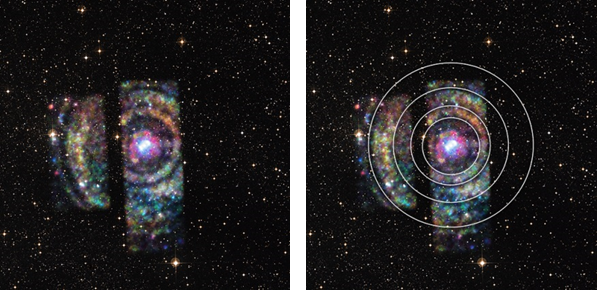
A Galaxy Hit-and-Run
Ripples found in the Milky Way’s disk reveal our galaxy survived an ancient hit-and-run. Now, astronomers might have caught the culprit.

Charting 70,000 Stars in the Milky Way
Astronomers have created an age-map of 70,000 stars spanning our galaxy, ushering in a new era of galactic archaeology.

Our “Magnetic” Black Hole
Astronomers have detected magnetic fields writhing around the Milky Way's central black hole.

Star-Counting in the Galactic Bulge
Astronomers have taken a careful census of the smallest stars in our galaxy’s center.

Milky Way: Young Stars in an Old Bulge
The presence of stars just 100 million years old in the Milky Way Galaxy’s central regions confirms our galaxy’s nonviolent past.

Buckyballs Solve Interstellar Mystery
Soccer ball-shaped molecules lurking in the dusty corners of the Milky Way help resolve a long-standing problem.

Witnessing Light Echoes from a Neutron Star
X-ray echoes from binary star system Circinus X-1 are helping astronomers measure its distance from Earth.

Mapping the Outer Milky Way
Stars still embedded in their natal clouds act as signposts to map the Sagittarius-Carina, Perseus, and Outer spiral arms of the Milky Way.

Mysterious X-rays Spotted in Galactic Center
NASA’s NuSTAR mission has detected an unexpected haze of high-energy X-rays in our galaxy’s center, perhaps the signal of a mass stellar graveyard.

Ripples in the Milky Way
Astronomers have detected what look like four undulations in the Milky Way Galaxy’s disk. If the structures are all part of the disk, our galaxy is more than half again as large as we thought it was.

New Stars On Strange Orbits in Milky Way
Astronomers have found two just-born star clusters an incredible 16,000 light-years above the plane of the Milky Way galaxy.

New Stars in the Shadow of a Black Hole
New observations suggest that several dozen low-mass stars, and eventually perhaps even planets, are forming just 2 light-years from our galaxy’s supermassive black hole.

Cepheids Map Milky Way - and Beyond
Cepheid variable stars are helping astronomers see what our galaxy looks like from within.

Yellowballs: A New View of Star Formation
Thanks to the help of the general public, astronomers have discovered a new signature marking a hidden phase of star formation.

G2 Survives Black Hole Pass
The gaseous object G2 has survived its swing around the Milky Way’s central supermassive black hole, but the questions of what it is and where it comes from remain unanswered.

Laniakea: Our Home Supercluster
Astronomers have mapped the cosmic watershed and discovered a massive supercluster that extends more than 500 million light-years and contains 100,000 large galaxies. The Milky Way sits on the edge of this humongous structure.

Big Bang Inflation Evidence Inconclusive
New analyses suggest that observations heralded as evidence for the universe’s brief growth spurt don’t conclusively show what researchers thought they did.

Planck's Magnetic Map of Our Galaxy
The ESA's Planck mission has released one of the most detailed maps of the Milky Way's magnetic field.

Young Stars Lead the Magellanic Stream
Astronomers have discovered hot, young stars in the Leading Arm of the Magellanic Stream, calling the history of the Magellanic Clouds once again into question.

Fingerprinting the Circumgalactic Medium
A new study finds the space surrounding dwarf galaxies in the nearby universe to be shockingly pristine.
